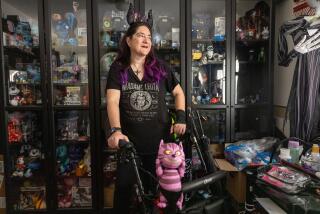Disabled Seek Improved Access to Public Facilities in Oxnard
- Share via
Disabled residents turned out at Oxnard City Hall on Tuesday to lobby officials to beef up a city plan aimed at making public facilities more accessible to them.
A woman in a wheelchair said she had a tough time just getting into the council chambers, where a public hearing on the plan was held Tuesday. A man who is hard of hearing told the City Council that he had trouble understanding the proceedings, even though the city provided a sign language interpreter.
Even the planning document itself was attacked for not being available in Braille or large print.
“We should be able to eventually, and soon, travel anywhere in the city,” said Sharon Dreyer, one of half a dozen people in wheelchairs who attended the public hearing on the citywide effort. “It is not a matter of choice, but a question of civil rights.”
The plan was prepared to comply with the Americans With Disabilities Act, a federal mandate signed into law last year that prevents discrimination against people with disabilities.
Under terms of the law, all public agencies and private businesses with 25 or more employees are required to make “reasonable accommodations” for employees and customers with physical, mental or learning disabilities.
At Oxnard City Hall, the head of each of the city’s 16 departments helped draft a plan to make facilities more accessible.
Library staff members, for example, pitched a proposal to expand their large-print and audiotape collections and to send library employees to school to learn sign language. The city clerk’s office wants to provide large-print agendas for the visually impaired and make sign language interpreters available upon request at public meetings.
Public works officials proposed renovating restrooms on the first floor of the Civic Center building, a recommendation blasted by advocates for the disabled who want restrooms on each floor to be made accessible.
But public works staff said the city cannot afford the $84,000 it would cost to alter the 12 restrooms in the building. Redevelopment and parks and recreation officials also cited prohibitive costs in retrofitting facilities under their control.
Karl Lawson, the city’s ADA compliance manager, said some of the modifications that are called for in the plan--such as shaving conference tables so wheelchairs can roll underneath or writing job announcements in large print for the visually impaired--can be done at little cost.
He said the city has set aside about $300,000 for modifications, but the federal law does not require public agencies or private employers to make changes that would cause “undue hardships.”
“This is not the land of Oz. We do not have unlimited funds,” Lawson said. “We must prioritize our funding to carry out the mandates of the ADA.”
The council directed city staff members to study comments made at Tuesday’s hearing and return with detailed recommendations on how to make the needed improvements.
In the meantime, advocates for the disabled hope that changes will come soon.
“Budget troubles may not be an excuse for a public entity not meeting the requirements of the ADA,” hearing-impaired resident Gerald Dominick told the council. “I want to say this place is not accessible to the hard of hearing.”
Linda Galbraith, who lost a leg in a traffic accident in 1982 and uses a wheelchair to get around, said there are still a lot of problems with the city’s plan.
She attended the public hearing but didn’t address the council because she has filed a lawsuit against the city stemming from an injury she sustained after falling out of her wheelchair in a dirt parking lot at the California Strawberry Festival in May.
“A lot of us are frustrated because we have been asking for a long time for equal access,” Galbraith said. “A lot of times it seems that our requests have fallen upon deaf ears.”
More to Read
Sign up for Essential California
The most important California stories and recommendations in your inbox every morning.
You may occasionally receive promotional content from the Los Angeles Times.










